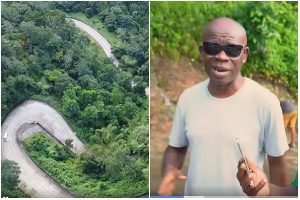How East Cantonment Pharmacy boss, Rocksters, other big Kwahu indigenes beautify the town

The stories of extremely successful people lowering themselves to the point where they pick up brooms and other working tools just to tidy up major roads that are usually littered with rubbish is not heard often.
But even more inspiring is the story of how Ebenezer Kofi Bediako Amoafo-Hene, the Managing Director of the East Cantonments Pharmacy Limited (ECPL), used his influence to rally support from other influential inhabitants of Kwahu to ensure that they keep the roads leading to their hilltop township always clean.
Speaking in an interview with a vlogger, Kwahu Ambassador, who vlogs about Kwahu and its people, the ECPL boss explained the genesis of this initiative and why he had to eventually commit resources to it.
“I usually come to this town and I am someone who doesn’t like dirt and so any time I come and I see that things are not in the right shape, I look away before I can even get to my house.
“And so, I suggested to my friend, Kamas, who is in Germany that why won’t we just use these health walks as an opportunity to pick up the litters along the stretch, as a way of our contributions to our town, Kwahu,”
With the endorsement from his friend and other indigenes of the town with great influence in society, such as the owner of Rocksters Roofing Systems Limited, gave him, he run with it.
He explained in the interview that he eventually had to settle on paying some hand-picked people a monthly fee so they could ensure that they beautify the edges of the roads leading to Kwahu.
“So, we started and our numbers started to grow but seeing that Kamas was the one who had taken up the project as if it was his own, when he left, the place started to look dirty again.
“He had a team he left behind to work but you know how our people are; when they are doing something without rewards, they do not put in their best and so we decided that it would be better to handpick some people that can be supported in a way, and then handed the job of taking care of the area. And like I mentioned earlier, in the past, it was difficult for me to look around when I was returning here but when I realized that I could invest a little into people to get the place constantly cleaned, I jumped for it,” he explained.
Background
The Kwahu or Okwawu are hardworking mountain-dwelling agriculturalist and the famous business-oriented Kwa-speaking people that forms a subset of the larger Akan ethnolinguistic group living in the south-central Ghana, on the west shore of Lake Volta in the Eastern Region. The Kwahu live specifically on part of the Kwahu sandstone plateau, with the Afram Plains to the north, Akim Abuakwa to the south, Ashanti Akim to the west, and the Volta River forming an approximate boundary to the east.
Kwahu people speak a Twi-dialect of Akan language, which is within the Kwa language group (Twi, Sefwi, Mfantse, Chokossi, Nzema, Ewe, et al), but also falls in the larger Niger-Congo phylum. The derivative of Kwahu-Twi spoken in indigenous Kwahu towns such as Abene, Abetifi, Pepease, Atibie, Nkwatia, Obo, Bepong, Tafo, Akwasiho, Obomeng, Twenedurase, Nteso, Nkwakwa, Mpraeso, Asakraka, Aduamoa, Pitiko, Sadan, Burukuwa, Nkwantanane, Ahinasie and Donkorkrom is slightly different from Asante-Twi, Akwapim-Twi and Akyem-Twi. According to Linguists Kwahus are fond of using the syllabi (La), (hunu) and the like. Thus they end their speech and pronunciation with words that end with “La” sound. In most cases, you will find that instead of “saa” the Kwahu ends it with “Saala” (that’s it), “yei ala” (just this). Therein dwells the distinction, and the Kwahus especially Obos are noted for such trend in speech delivery. The Kwahu slogan is Asase Aban, Yεnte Gyae (Protectors of the Land, We don`t quit) and also Oboכּ (Rock) or Oboכּba (Child of the Rock).
The beautiful Kwahu Scarps, their residential polity has received platitudes from historians and anthropologists alike. Historians Macmillan and Kwamena Poh (1965) describe the wonderful climate of their mountainous town, Abetifi as “… the Switzerland of West Africa, with nights as cool as May nights in Europe”.
The people are very wealthy and successful traders who were the first to utilize their interior middlemen role to emerge as strong local business gurus.
Watch the video below as posted by Kwahu Ambassador:
Source: www.ghanaweb.com







